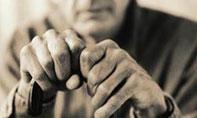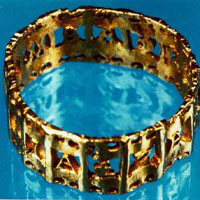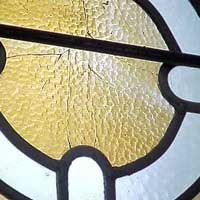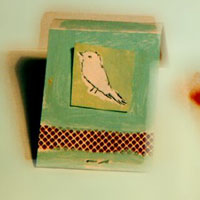- About Us
- Columns
- Letters
- Cartoons
- The Udder Limits
- Archives
- Ezy Reading Archive
- 2024 Cud Archives
- 2023 Cud Archives
- 2022 Cud Archives
- 2021 Cud Archives
- 2020 Cud Archives
- 2015-2019
- 2010-2014
- 2004-2009
 |
The Legacy |
The large yellow manila envelope contained an old cigar box, beaten worn and dusty. I looked up through the windscreen and into the rain soaked streets.
It would be dark soon, and people were expecting me at the wake. The funeral had been pleasant enough, given the circumstances -my mother was obviously distraught- but everyone had agreed in whispers that it was all for the best, and that he had suffered long enough. Now, as had become an all too familiar practice in my family of late, the entire herd would head over to the house for the wake to graze and drink far too much whisky. They would reminisce for hours in smoke filled rooms, forget how much closer their own end was fast approaching, and confuse stories of this dearly departed soul with a hundred other dearly departed lost souls that had expired weeks, months and years ago. The prospect of such frivolity wasn't especially enticing. No, today, they could carry on without me. I wanted to open the cigar box.
Rusty hinges squeaked open and I surveyed the contents within. A yellowed and fading handwritten note offered:
 ...For Andrew, my beloved Grandson, my lifetime of memories....
...For Andrew, my beloved Grandson, my lifetime of memories....
Beneath the note lay four objects, each wrapped in a separate white handkerchief. A small shard of orange and blue stained glass, a United States Marine Corps tie clip, an empty book of matches from a place called 'The Herald's Inn' in Buffalo, New York with the inscription 'Sarah Tobias' on the inner leaf, and a gold ring encrusted with a single diamond. On either side of the diamond were two empty sockets where other stones must have once been in place. The contents of this box, then, were all that were left to me by a man I never knew.
I had, of course, met my grandfather, and I 'knew' him in a sense, but distances from one country to another and the kind of grief between families that always seems to grow from nothing and yet last an eternity meant that I met him but twice in my life. At the age of nine, over a period of but a week, I stayed with my grandfather in his home, but in those few days, amid the rush of so many other relatives and well-wishers, he was lost to me in the glut and hurry of new faces and experiences. I recall his enormous hands, one always wrapped tightly around a beer bottle, the other consistently holding a fat, moist cigar. He had a healthy roar of a laugh, but this was reserved for late nights and old friends that made my grandmother scowl. Always tanned as he frequently spent time out on the boat fishing, I slipped it to him one afternoon that I loved octopus -though I never did, and cannot understand why I made this claim- and he bought me pounds of the stuff. Large, oversized tentacles sat in a wet paper bag at the back of his refrigerator for the entire week I was there, left untouched and gradually sharing their aroma with the rest of the neighborhood.
My last evening in the house, well after my grandmother had sent me to bed with a glass of milk, I awoke to the familiar midnight roars of laughter. Mindful not to wake my mother, I slowly crept down the stairs through the living room and toward the kitchen door, where thin slivers of orange light crept through from the other side and cast eerie shadows across the room. Tip-toeing a little closer, I carefully placed my ear near the door and listened to the voices on the other side. From within the kitchen, my grandfather was in full flight. Obviously well liquored up and using coarser language than I had ever heard in any late night movie, he was telling story after story of his life, of his escapades, his conquests and his defeats to an equally drunken, willing recipient of his tales. His partner could manage only the odd slurred comment of ...You're kidding!... ...You don't say!... and ...Tell me you're joking!... as he fought back tears of laughter, slapping incessantly at his thigh in excitement. Spurred on by the encouragement, with sip after sip from his bottle, my grandfather poured out a million memories and revelations onto the kitchen table. In fifteen minutes, hidden behind the door, I took in more of places like Las Vegas and Guadalcanal, beautiful, willing women, lost bets and seized opportunities than I could digest, let alone understand. And so it was, suspiciously sneaking a listen at secret adult conversations, that I hardly even heard my Aunt creep up behind me and, with a giggle, ask: "What are you doing there in the corner?"
To say I jumped is something of an understatement. I threw myself against the wall in a horrid mix of fright and deep-red embarrassment, and began whispering apology after apology as she simply stood and stared at me with a wry smile, hands on hips and shaking her head in amusement. Eventually she managed to calm me down and reassured me, "It's okay, Andrew, it's okay. But don't be ashamed to go in there and listen. These are your family stories. It's important you hear them."
With a wink and another giggle she was gone. Momentarily the two inebriated  fellows in the kitchen stopped for a second and took in the disturbance next door, until I heard my grandfather swig another gulp of beer and continue on with the fast-paced tale. Alone again in the living room, still unable to move from my frozen position against the wall, I stood for what felt like an eternity and contemplated my Aunt's words. I thought about entering the kitchen and pulling up a stool. I fidgeted and mulled over the possibility for a while longer, but I had lost my bravado and gumption, and I quickly raced upstairs and leapt back into bed, eventually falling to sleep as the howls and laughter continued in the room below. Given that I was but nine years of age, one might be forgiven for lost opportunities. I'm not so sure anymore.
fellows in the kitchen stopped for a second and took in the disturbance next door, until I heard my grandfather swig another gulp of beer and continue on with the fast-paced tale. Alone again in the living room, still unable to move from my frozen position against the wall, I stood for what felt like an eternity and contemplated my Aunt's words. I thought about entering the kitchen and pulling up a stool. I fidgeted and mulled over the possibility for a while longer, but I had lost my bravado and gumption, and I quickly raced upstairs and leapt back into bed, eventually falling to sleep as the howls and laughter continued in the room below. Given that I was but nine years of age, one might be forgiven for lost opportunities. I'm not so sure anymore.
When I was twenty-three I took a seat at my grandfather's side, excited but also full of apprehension. He was no longer in his home, but in the proverbial 'home'. My grandmother had succumbed a few years before to cancer and now, ailing, my grandfather had been placed into the care of a retirement home. But his loss, his illness, it mattered little to me, for now, with a whole month at hand, I planned to catch up on all those stories I had contemplated for thirteen years. Unfinished stories. Previously withheld revelations. These pieces of information were important to me, I hungered for them, and now, I had come to collect. I had come to finally really get to know my grandfather, who he was, and what he had done. I studied my grandfather's face. He looked upon me with soft, warm eyes, but there was no recognition in his vacant, kindly stare. I reintroduced myself and he calmly nodded. Extending a weak, limp hand, naked without its cigar companion, we greeted each other.
"How are you, Grandpa?"
"Well, well... I'm just a little tired today, is all..." He turned and faced a blank television screen. "Nothing's on, today, I'm afraid..."
"How do you like it here?" I asked. My grandfather remained fixated on the empty television screen, distracted only briefly by a young nurse who interrupted his thoughts to offer him some medication and a glass of water. He patiently took a large white pill into his mouth, smiled at the nurse, and returned to the screen.
"How do you like it here, Grandpa? Everything alright?" Startled, he turned to face me. A frown quickly vanished into a smile.
"Oh, hello,... he whispered. ...I wasn't expecting you here..."
For the next three weeks I visited my grandfather every day. I read to him, held his hand, took him for walks, and for hours, long, endless hours, we talked about nothing.
I was just too late.
Occasionally I tried to prompt him. I asked him, "What do you think of Iwo Jima? ...Tell me about your father... ...How did you first meet Grandma?" But each question was answered with bewildered stares followed by cryptic, incoherent sentences that would invariably, eventually, be interrupted by another visit from a nurse with more medication. I knew very little about this old man. He had been estranged from his only son now for over thirty years. He was a United States Marine, active in World War Two, operator of a bar in Buffalo, New York, and a man who loved the outdoors and spending long Sundays on his boat, fishing. These splices of information told me nothing substantial of the character, the true nature of my grandfather. Still, I knew well enough that he deserved better than sitting out the remainder of his days confined to a wheelchair, soiled and medicated, confused and alone, not even aware of the fact that he had been set aside to die.
 The last time I saw my grandfather I arrived, as I always did, to his bedroom at about nine in the morning. As I walked down the long, empty hallways of the home and approached his room, I noticed a slight, faint tapping sound, becoming louder and clearer with each step forward. By the time I reached for the door to my grandfather's room I realised the tapping came from within. I entered, and found my grandfather lying on the floor beside his bed, tears streaming down his face, messed in his own filth, tapping at the radiator with his wooden cane. I instantly rushed to his aid, but as frail and withered as he was, he was a dead weight, and I struggled and fought to lift him back on the bed. Frantically, I pounded my fist down on the emergency call button and waited for a nurse to arrive. I returned to my grandfather's side, took him by the hand and reassured him he would be fine. But gone was the blank stare. Gone was the vacant look. My grandfather squeezed my hand tight, suppressed every pain and agony that crawled through his body and, summoning up every precious piece of energy within him, he leaned into me. Shaking, his eyes fixed upon mine with a glare I hadn't seen in thirteen years. Fighting back tears, he whispered, "Look what's happened to me! Look what's happened to me!"
The last time I saw my grandfather I arrived, as I always did, to his bedroom at about nine in the morning. As I walked down the long, empty hallways of the home and approached his room, I noticed a slight, faint tapping sound, becoming louder and clearer with each step forward. By the time I reached for the door to my grandfather's room I realised the tapping came from within. I entered, and found my grandfather lying on the floor beside his bed, tears streaming down his face, messed in his own filth, tapping at the radiator with his wooden cane. I instantly rushed to his aid, but as frail and withered as he was, he was a dead weight, and I struggled and fought to lift him back on the bed. Frantically, I pounded my fist down on the emergency call button and waited for a nurse to arrive. I returned to my grandfather's side, took him by the hand and reassured him he would be fine. But gone was the blank stare. Gone was the vacant look. My grandfather squeezed my hand tight, suppressed every pain and agony that crawled through his body and, summoning up every precious piece of energy within him, he leaned into me. Shaking, his eyes fixed upon mine with a glare I hadn't seen in thirteen years. Fighting back tears, he whispered, "Look what's happened to me! Look what's happened to me!"
As nurses rushed into the room they cleared me out into the corridor and I made way for a multitude of machines, tubes and specialists in white coats. My grandfather, who had fallen to the ground and remained there for some five hours of misery, fully aware of his desperate plight and decline as a man, continued to stare at me with such a determination, such a resolve as I'd never seen. Such a sad, sad resolve, that I could not stand to bear witness to his tragedy. I never visited him again.
For years now, since I last saw my grandfather, I've cursed my parents for taking me so far away from my roots such a long time ago, for depriving me of my family connections. But the blame does not lie with them. Nor can I blame the liquor, the disease, the doctors or the weak heart that eventually took my grandfather's life. In truth, there is no one to blame for my loss, nor the loss my children have now suffered for the stories they can never be told. There just weren't enough of those precious minutes, hours and days for me to learn it all.
me so far away from my roots such a long time ago, for depriving me of my family connections. But the blame does not lie with them. Nor can I blame the liquor, the disease, the doctors or the weak heart that eventually took my grandfather's life. In truth, there is no one to blame for my loss, nor the loss my children have now suffered for the stories they can never be told. There just weren't enough of those precious minutes, hours and days for me to learn it all.
And so it is, that I now find myself sitting in my car, parked at the side of the road on a glum, rainy evening, as my family waits for my arrival at the wake. Looking into an old cigar box left to me in my grandfather's will I see a small shard of stained glass, a United States Marine Corps tie clip, an empty book of matches, and a gold ring encrusted with a single diamond. The box contains a lifetime of memories, and though they have value to me, though they were left to me with purpose in mind, their meaning, their significance, is unknown.
I can't help but think that the answers lie back many years, in the middle of another smoke filled, late, late night, and in the words of a happy, proud man, seated at the head of his kitchen table, who has had a little too much to drink.
That I might have another chance to take a seat at that table.
